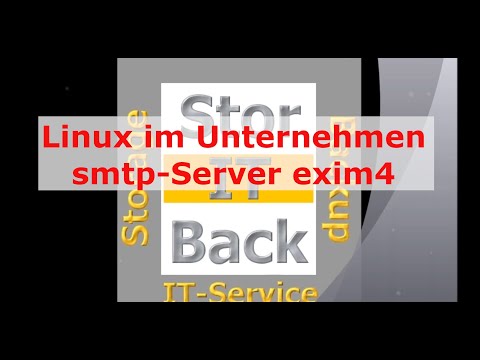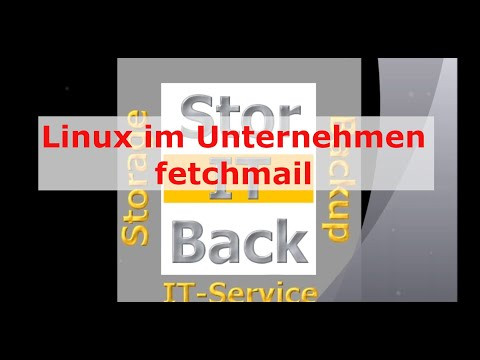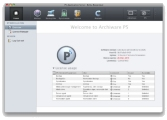

Linux im Unternehmen - Mailserver aus exim4, dovecot und fetchmail V1.3 (c) Stor IT Back 2025
Wir installieren einen einfachen, aber kompletten Mailserver auf Debian. Dazu nutzen wir exim4 als MTA (Mail Transfer Agent),
dovecot als POP3 und IMAP-Server und fetchmail zum Abholen von Mail bei verschiedenen Mailprovidern.
Dieser Mailserver kann die Verwaltung von verschiedenen Usern übernehmen, sowie von verschiedenen Mailprovidern über unterschiedliche
Wege Mails empfangen bzw. abholen. Die Erweiterung auf eine Weboberfläche und SPAM- und Virenkontrolle ist möglich.

Linux im Unternehmen - Mailserver auf Linux, die Grundlagen.
Wie ist der Mail Server in unserem Beispiel aufgebaut? Der Empfang der Mails ist über SMTP von außen möglich, oder die Mails werden per fetchmail von einem Provider abgeholt. Die Verwaltung der Mails wird von Dovecot, entweder in einer Verzeichnisstruktur oder einer Datei vorgenommen. Eine Userverwaltung ist dabei natürlich möglich. Der Zugriff erfolgt intern über pop3 oder imap, von verschiedenen Clients und Geräten.
Der MTA, in usnerem Beispiel exim4, übernimmt den internen Transport der Mails, die Kontrolle der eingehenden Mails per SMTP und die Weiterleitung an Dovecot oder das Verschicken der Mail an den Empfänger oder einen Smarthost bei einem E-Mail Provider.

Linux im Unternehmen - exim4 als MTA installieren und konfigurieren.
Im Video angesprochene Einstellungen und Befehle als Copy & Paste:
Anpassung der virtuellen Maschine: cd /etc vi mailname vi hostname vi hosts cd networks vi interfaces Rekonfiguration von exim4 und Anpssung auf Smarthost: dpkg-reconfigure exim4-config systemctl restart exim4 Anpassung des Servers auf Maildir: cd /etc/pam.d/ vi login # Prints the status of the user's mailbox upon successful login # (Replaces the `MAIL_CHECK_ENAB' option from login.defs). # # This also defines the MAIL environment variable # However, userdel also needs MAIL_DIR and MAIL_FILE variables # in /etc/login.defs to make sure that removing a user # also removes the user's mail spool file. # See comments in /etc/login.defs session optional pam_mail.so dir=~/Maildir standard vi su # Defines the MAIL environment variable # However, userdel also needs MAIL_DIR and MAIL_FILE variables # in /etc/login.defs to make sure that removing a user # also removes the user's mail spool file. # See comments in /etc/login.defs # # "nopen" stands to avoid reporting new mail when su'ing to another user session optional pam_mail.so dir=~/Maildir nopen vi sshd # Print the message of the day upon successful login. # This includes a dynamically generated part from /run/motd.dynamic # and a static (admin-editable) part from /etc/motd. session optional pam_motd.so motd=/run/motd.dynamic session optional pam_motd.so noupdate # Print the status of the user's mailbox upon successful login. session optional pam_mail.so dir=~/Maildir standard noenv # [1] Mail intern anliefern: echo "TEST" | mail -s "Subject" root Mail extern anliefern (von einem anderen Rechner aus): stephan@lap2:~/Videos$ telnet 192.168.2.206 25 Trying 192.168.2.206... Connected to 192.168.2.206. Escape character is '^]'. 220 mailserver.stortest.org ESMTP Exim 4.94.2 Wed, 09 Mar 2022 13:50:25 +0100 EHLO test.test.org 250-mailserver.stortest.org Hello stephan-lap2.storitback.org [192.168.2.10] 250-SIZE 52428800 250-8BITMIME 250-PIPELINING 250-PIPE_CONNECT 250-CHUNKING 250-STARTTLS 250-PRDR 250 HELP MAIL FROM:test@test.org 250 OK RCPT TO:stephan@stortest.org 250 Accepted DATA 354 Enter message, ending with "." on a line by itself Subject: Dies ist der Titel Dies ist der Text. . 250 OK id=1nRvmd-0000DO-N3

Linux im Unternehmen - dovecot als POP3 / IMAP Dienst installieren und konfigurieren.
Im Video angesprochene Einstellungen und Befehle als Copy & Paste:
Installation von dovecot: apt install dovecot-imapd dovecot-pop3d Installation imap cli Client: apt install mutt Anpassung dovecot unter /etc/dovecot/conf.d: /etc/dovecot/conf.d/10-auth.conf: disable_plaintext_auth = no auth_mechanisms = plain login /etc/dovecot/conf.d/10-mail.conf: mail_location = maildir:~/Maildir /etc/dovecot/conf.d/10-ssl.conf: ssl_cert = </etc/dovecot/private/dovecot.pem ssl_key = </etc/dovecot/private/dovecot.key ssl = yes systemctl restart dovecot.service (nicht vergessen) systemctl status dovecot.service

Linux im Unternehmen - fetchmail als POP3 / IMAP Abholung installieren und konfigurieren.
Im Video angesprochene Einstellungen als Copy & Paste:
Installation von fetchmail: apt install fetchmail Konfiguration suchen: find / -name fetchmail* cp /usr/share/doc/fetchmail/examples/fetchmailrc.example /etc/fetchmailrc poll pop.gmx.net with protocol pop3 user "xxxx@gmx.net" there with password "yyyy" is stephan here smtphost localhost; chmod 600 fetchmailrc chown fetchmail fetchmailrc /etc/init.d/fetchmail start (bzw. restart oder erst stop) Ausgangsadresse entsprechend anpassen: vi /etc/email-addresses echo "Dies ist ein Test" | mail -s "TESTMAIL" xxxx@gmx.net mutt -f imaps://stephan@localhost Logs von fetchmail: /var/log/syslog --> cat /var/log/syslog | grep fetchmail







